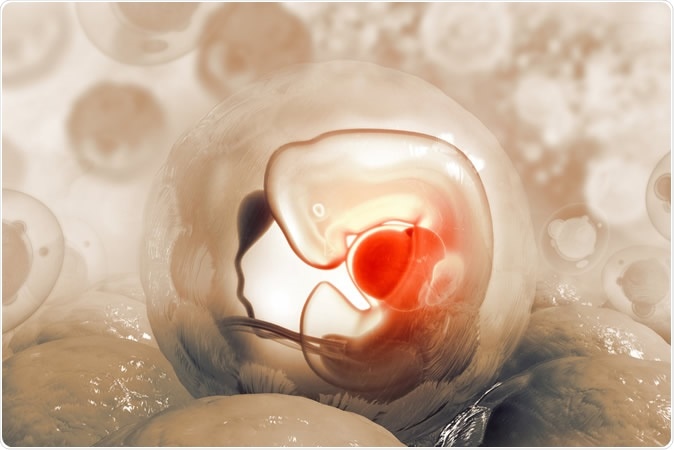In a new study, scientists confirmed that babies who are exposed to higher levels of estrogen while they are in the womb are more likely to be autistic. The study titled, 'Foetal oestrogens and autism', is published in the journal, Molecular Psychiatry.
The finding supports the 20-year-old theory of prenatal sex steroid for autism. Researchers from the University of Cambridge and the State Serum Institute in Denmark worked to measure the levels of four hormones in fetuses within the womb. Two of these hormones were androgens. This 2015 study showed that androgen levels were higher in male fetuses, as expected, and higher in 98 fetuses who later became autistic. Androgens impact brain development towards masculine development and affect the synaptic connections between brain cells. Autism occurs more often in boys, and thus androgens are thought to perhaps hold one key to this phenomenon.

Human fetus on scientific background. 3d illustration credit: crystal light / Shutterstock
The current study extended these measurements to estrogen levels in the same set of amniotic fluid samples used for the previous study. The scientists measured the four hormones, estriol, estradiol, estrone and estrone sulfate, and found, surprisingly, that there was an even stronger association between higher levels of estrogen and autism. In other words, estrogen was present at significantly higher concentrations in the 98 individuals who became autistic compared to the 177 who did not. The sex steroids most strongly linked to autism were estradiol and progesterone.
Autism affects three times as many boys as girls, and affected girls have a greater chance of multiple mutations, giving rise to the hypothesis that boys are intrinsically more likely to develop this condition due to their sexual differentiation. The findings in support are many and diverse: firstly, women with autism show abnormal brain structures in brain areas that differ from males to females. Secondly, autistic males have brains that show both increased masculine and feminine traits compared to controls without autism. Next, autistic individuals have a clear trend towards masculine scores when measured for traits like empathy and systemizing, again, androstenedione, an androgenic hormone, is elevated in autistic women. And finally, autistic children have facial features that are strongly masculine as evaluated by 3D photogrammometry.
This is supported by studies showing that autistic boys have a larger surge in fetal testosterone compared to controls, and that the 2D:4D digit test which shows fetal exposure to androgens is positive in these children. Their mothers are more likely to have had excessive androgen levels as shown by a history of polycystic ovarian syndrome, while both autistic individuals and their mothers have a higher risk of sex steroid-dependent cancers, namely, those of the breast and ovary.
Estrogen not only feminizes the body but causes masculinization of the brain in many mammalian species and affects brain development by increasing the number of connections between nerve cells. In fact, it affects social behavior in some rodent species, but only in males. Its multiple actions on the brain during development have led to its being called a “neurosteroid”. According to scientist Simon Paul-Cohen, “This new finding supports the idea that increased prenatal sex steroid hormones are one of the potential causes for the condition. Genetics is well established as another, and these hormones likely interact with genetic factors to affect the developing fetal brain.”
The next step will be to source track the estrogens - do they come from the baby, the mother or the placenta? The androgens measured earlier are also known to be converted into estrogens within the body and could be one source of the high estrogens.
Another Cambridge researcher, Alexa Pohl, explains: “This finding is exciting because the role of estrogens in autism has hardly been studied, and we hope that we can learn more about how they contribute to fetal brain development in further experiments. We still need to see whether the same result holds true in autistic females.”
However, this finding will not be used to screen for autism, as the focus of the study was to understand more about the pathogenesis of the disease, moreover, the link to female autism was not explored due to a paucity of subjects in the test window. These represent areas for further research.
Journal reference:
Foetal oestrogens and autism, Simon Baron-Cohen, Alexandros Tsompanidis, Bonnie Auyeung, Bent Nørgaard-Pedersen, David M. Hougaard, Morsi Abdallah, Arieh Cohen & Alexa Pohl, Molecular Psychiatry (2019), https://www.nature.com/articles/s41380-019-0454-9